Welcome back readers, and welcome, new readers –
We hope your Christmas celebrations were wonderful, and that you’re enjoying the days “between the years”, whether as a time for reflection, for extra sleep and long walks, for reading the books and playing the games that were in the Christmas presents, or for eating the Christmas leftovers in the fridge.
It is now a year since we posted from this substack for the first time (we introduce ourselves in this first post, so if you’re a recent subscriber and wonder who we are, click the link to find out). We’ve written about where we each live on Bruderhof communities around the world (since writing this, Trudi moved from South Korea to southwestern Pennsylvania) and why, as Bruderhof members, we live without money. We wrote about welcoming babies and what happens when kids start school. We wrote about how we negotiate use of technology in our daily lives, and a post about summer activities that somehow turned into an ode to cats. We also wrote odes to spring and autumn. When hostilities started in Gaza in October, we reflected on war in our world, and ended the year thinking about Jesus’ mother.
If there are topics you would like us to write about in the new year, please let us know!
What we’re enjoying in the last week of the year
Trudi
I have now decided what I am enjoying. Marianne, thank you for excusing me last time, but truthfully I was so busy that I simply forgot to write that part. . . .
But now I’ll tell you: I am sitting on my bed, enjoying a cup of tea, which is currently balanced on a sturdy, hardcover book. It’s the Amy Carmichael biography I started months ago and still intend to finish. Amy would forgive the misuse. She loved a good cup of tea.
The post-Christmas days give me time for reflection. I think of my last two Christmases in Korea, and all the people whom I was blessed to meet, know, and love there. As I sang Christmas carols in English this year, memories of singing the same in another language, in another country drew my thoughts to the whole world, all people, for whom Christ was born.
Yesterday, I was singing Christmas carols with a few women in the tiny chapel room of a local jail. Bible study happens every week but at Christmas time, the gathering takes on a special depth. We sing and pray, clinging to the belief that Jesus is present when we feel the lowest. In the last verse of “Away in a manger”, the line “Bless all the dear children in Thy tender care” becomes a prayer of mothers behind bars. But in the midst of pain, I could sense joy and I marveled: strangers meeting together to celebrate the birth of a baby. Immanuel, God with us. Everywhere.
Perhaps best of all this Christmas was my kindergarten classroom, alive with shepherds, angels, kings, and more. Singing seemed to become as normal as breathing and even a short Korean carol about Christmas bells ringing for Jesus’ birth became a quick favorite. Enjoy a listen, and have a Happy New Year!
Norann
As unfair as this is going to be to all of you living in the northern hemisphere, I’m enjoying summer.
The feasting:
The flowers:
The swimming (in between the rain and hail storms):
Celebrating a few minutes of a white Christmas (large hail) as we decorated the tree:
And most of all, giving great thanks for the gifts this year has delivered (most of all, for us, the return of Mom – Chris’s mother and everyone’s “Gram” – to Australia from New York, and that our two oldest sons became our brothers in Christ through baptism), while at the same time holding great pain for and with friends (warfare, cancer diagnoses, babyloss, and friendship wounds).
But, as our dear friend Rosemary Breen (85 years, pictured above by the hail storm) prayed at our Christmas Eve dinner (an event she hasn’t missed in 21 years):
“May we all be light-bearers in this new year to come, and be unafraid of the places where that light takes us. Because we know, oh Lord, that you make all things new.”
Marianne
One aspect of this Christmas that has been special is that our neighbors recently welcomed their first child. Here she is being visited by our five-year-old in her angel costume.
Finally, as a New Year’s greeting for you, our lovely readers, here is a Christmas story by Bruderhof member Ger Koopman (who is also the author of what might be the best Christmas short story, “The Chess Player”). Both stories are family favorites for reading aloud at this time of year. Written in England in 1952 in the hard years following the Second World War, it’s a reminder that cynicism and meanness will always give way in the presence of the Christ Child.
The Four Old Men – A Christmas story
On a cold Christmas evening, when the earth was covered with snow, four old men walked through a forest. They were very old men. The youngest was seventy-six years old, and the eldest eight-four. All four had coats made of old sacks. You could still read the printing saying what the sacks had been used for a long time ago. “Seed potatoes” was written on the oldest man’s back.
They were poor, these old men, they were really very poor. They had no house in this world and together they didn’t even possess one penny! All they had was one loaf of bread. The eldest man had it in his pocket. Many times that evening they had asked him to divide the bread amongst them because they were so hungry. But every time he had answered them, “Not until we have found a place where we can sleep.”
They each had a name of course, but they had given each other nicknames.
The youngest was always grumbling about the women. For one reason or another he hated women. They called him Bachelor.
The second was always grumbling about the rich people. They called him Socialist.
The third grumbled about everything, women and men, rich and poor. They called him Communist.
And the oldest one? Now, he never grumbled. He was always satisfied. He kept the other three together. They called him Santa-Claus.
They had been walking the whole day, begging here and there for some food or some money. But everyone was so busy with the preparations for Christmas that nobody had time for these four old beggars. And the only thing they had got was the loaf of bread.
Suddenly Socialist said to Santa-Claus, “Are you really sure that we are on the right path?”
“Yes we are. In a quarter of an hour we will reach the hut we are looking for. In summertime it is often used by young people as a camping place. But now, nobody will be there. There we will have our supper. There is an old stove so that we can make a fire, and straw enough so that we can make our beds. And there I will tell you the Christmas story.”
“What story is that?” Bachelor asked. “Is it about women?”
“It is about a woman, but about a very good woman.”
“There are no good women. You can keep your story to yourself!”
Then Socialist asked, “Is it about rich people?”
“Yes, also about rich people. About three kings! But they were good kings!”
“Oh, what nonsense. You can keep your story to yourself. There are no good rich people!”
“It is about the Christ Child,” Santa-Claus said.
Communist laughed. “Of course it is a nonsense story. All stories are nonsense. The only thing that is important is a dry place to sleep in and a good meal. No, Santa-Claus, you can keep your story to yourself!”
Santa-Claus was sad. He liked the story so much and it was Christmas Eve! How could you celebrate Christmas Eve without the Christmas story?
And at that moment they met the Christ Child! He was sitting on the side of the path. Yes, the real Christ Child! If you had met the real Christ Child, you would have sprung up into the air for joy, wouldn’t you? You would have taken him home and given him the nicest place near the Christmas tree. . .wouldn’t you have done so? But the four old men. . .
“A child, look, a child in the snow!” said Bachelor. “Is it not a shame! I am sure his mother left him here alone. What a bad mother.”
“No,” said Socialist. “You can see by his clothes that he is poor. I am sure that his parents died of hunger, because the rich would not help them and suppressed them. Now he is alone in this world and lost in the forest.”
“Nonsense,” said Communist. “I am sure he is a bad lad. Of course he had been stealing, and now he has run away out of fear and has lost his way.”
All four stood around the boy in their coats of sack, with the high hoods over their heads, with their long white beards, and covered with snow like four ‘Father Christmases.’
But Santa-Claus said, “Who are you, little boy? Why are you sitting here in this lonely forest in the snow? Go home, you will freeze here.”
And the boy said, “I am the Christ Child.” All the four laughed. I must tell you, however, that the boy looked like a poor boy, cold and miserable. He had no crown of light around his head, he had no beautiful clothes on as you see sometimes in pictures and on Christmas cards.
“Ah well,” Communist said. “The Christ Child out of the story of Santa-Claus. That is a good joke. No, my boy, if you were the real Christ Child, you would not be here. Even a palace would not be good enough for you.”
Quietly the boy said, “I am hungry. Haven’t you got something for me to eat?”
Santa-Claus put his hand in his pocket, but he took it out again. “We ourselves are only four old hungry beggars. Together we have only one loaf of bread. You are young. See that you reach a farm soon and ask there for food.”
“My legs are frozen. I cannot walk,” the Christ Child said.
Now Communist pulled Santa-Claus with him. “Come on! One minute longer and you will give our bread away. Leave him. We have enough with our own poverty. Come on.” The others followed him and so they left the Christ Child alone, half frozen and hungry; alone in the dark forest.
Oh, if only we had been there!
At last they reached the hut. “That looks like a good place.”
“It has a chimney and windows!”
They opened the door, and lit a candle. “Well, well, this is a real palace. See, there is the stove. I will go look for wood to make a fire,” Communist said, and went away to find wood. The others went in. Socialist made the beds ready with the straw. “See what I have found,” he suddenly called. He came to the table and showed the others four eggs. “A hen must have made a nest here! Aren’t we lucky. Four eggs!”
Communist came in with the wood. “Four eggs!” he said, when he had seen them. “We will fry them and we will toast the bread. That gives a good meal. See here is an old frying pan!”
“Look for the wine,” Bachelor cried. “Then we will have a real celebration.”
“We will have something better than wine,” Santa-Claus answered. “We will melt the snow on the stove and cool it afterwards. That is the best drink I know.” When they were all sitting around the fire and the hut began to warm up, the one called Bachelor started to cut the bread to toast it, and Santa-Claus said, “Shall I now tell the Christmas story?”
Bachelor stopped cutting the bread. He put the loaf on the table behind him and playing with the knife he said, “What Christmas story? I have told you already that it is nonsense. I shall tell you something I have never told you before! You laugh at me when I grumble at the women, is it not so?. . . Listen. . . When I was born my mother did not want me and she gave me to an old woman. This woman used me only to earn money. She wrapped me in an old cloth and showed me to the people. She only gave me enough food that I would not die, but I looked miserable. Then she said, ‘Give me some money for my child. He is so hungry. Have pity upon this poor child.’ When I became so tall that she could not carry me, she pushed me in an old pram, and later on I had to walk. I was always hungry and I looked like a living skeleton. When I was about eight years old, I ran away and begged for myself, and slept wherever I could find a place. But the police found me and took me to a place where boys without parents are educated, as they call it. Well, I learned a lot there but only bad things. Most of my mates were thieves. It is, of course, long ago now, and nowadays these things are much better, they say. There was a father and a mother to look after us, but the mother was as bad a mother as the devil a father. Oh, this horrible woman! She beat me and pinched me and often I got no food. It was always me, who had done everything which went wrong in the house.”
“When I was fifteen, I was free, free to go and work in a family. The man was good, but he was always away. The woman had a shop and I had to take the things to the customers. She always thought that I stole, because I came out of that house and because once a week a policeman came to see if I behaved well. Even if only one penny was lost she beat me. She was strong, and I could not do anything, otherwise she would have told the police and I would have to go to prison. One day I ran away. Since that time I have been a beggar, tramping through the country, until this day. I do not know why, perhaps it is my face that makes all women angry. But do not tell me there are stories about good women!” Bachelor took the bread again and began to cut the loaf.
“Listen to me,” said Communist. “You call me Communist! Well, I am communist. Listen. My father was rich. We had a factory with twenty laborers. I had a good education, but I was not satisfied. I was married. Often I would say to my wife, ‘It is not right that we have everything and the poor have nothing.’ Then she would look at me with her large eyes and stroke my hand and say, ‘You are wonderful. You speak like a poet about the poor.’ And I spoke with my friends, rich people like me. They all said, ‘Write it down. It is good what you say. Write a book, the king and everyone can read it. You will be famous.’ Yet nobody would do anything and nobody would help the poor. My father died and the workshop became mine. Then I divided the whole business. Every one of my workers got the same share and every one would earn as much as the other. Yes, the workers were glad, but my wife did not speak anymore about a poet. She was angry. “How can I live on such a little bit of money?” she asked. “How do others live on much less than that?” I asked her. She ran away to her parents.
“My friends came and told me I did wrong, the same friends who were so satisfied with my words before, but I went on. After a year, ha, ha, ha, after a year they put me on the street, my own workers. They paid me my share, one-twentieth! Why? Well, because they thought with the money that was over each year I would help other poor men. But they wanted to divide it among themselves. They wanted to be communist, but only for their own interests! I thought, 'The real poor, I must help the really poor.' I went to a big harbor. I worked with the poor. They had no rights. When they were ill they got no money, when they were old they got nothing, only if they worked. But their bosses were rich. I spoke to the workers. They listened. I became their leader, and after a year I went to their bosses and asked them for better wages. I only asked for a little raise and for payment when we were ill or when the weather was bad, and a few pennies more. They refused. We started a strike. Oh, I was a fool. We lost, of course. I was put into prison. ‘I was dangerous,’ they said. Well, I spent twenty years of my life to help the poor, but for most of the time I was in prison. And slowly, slowly I thought I might succeed. So many communists came that the bosses had to listen to us. I became a leader. Yet one day I left the whole business. I found that my comrades did not fight for the poor but for themselves. It was all as it was before. They got better wages, better houses, but once, when I asked them to give in money for the oppressed in another country, where conditions were much worse, they laughed. Well. I could talk for hours and hours, but believe me, every single one in this world thinks only of himself in the end. Men use fine words, grand slogans, but they’re only word, words!”
It had become very silent in the hut. Bachelor and Communist looked around with hard eyes, eyes filled with hate.
Socialist stroked his long white beard. Quietly he said, “I could tell about my life, about the rich people and about the poor. It's a sad, sad story. But last night (when we slept near that old farm in the hay-stack because the farmer would not give us a place inside), I could not sleep for a long time because it was so cold. I thought that tomorrow would be Christmas Eve and how even then everyone thinks only about his own Christmas Tree and his own presents, perhaps about the presents of his children and his friends, but for us there was no place. I was full of hate and then I had a dream. I came to the house of a rich man and he himself opened the door.’ Give me a few pennies,’ I asked as I always do. ‘Come in,’ he said and he showed me the whole of his beautiful house, even all his money, and in the end he said, ‘You can have it all.’ I was thrilled. ‘But,’ he said, ‘You must give me your heart and I will give my heart to you!’ ‘Why?’ I asked with surprise. ‘I have heart trouble. I am only to live for a few months, perhaps half a year.’ I ran away. ‘My heart is still good,’ I thought. And then I awoke. To be rich is not always as good as it looks to us!”
All this time Santa-Claus had been waiting. When Bachelor and Communist had spoken he thought that it had no sense to tell the Christmas story. They looked so angry. But now he had a little hope. And at once, he started, first hesitating, but after a few words he forgot everything and told the old, old story of the birth of Christ just with the same simple words as it was written down two thousand years ago. And as he was telling he saw how the others listened, after a while with open ears, how the hate disappeared out of their eyes, how they stroked their beards and sometimes nodded their heads, like old men do. For nobody could understand so well how you feel when people tell you that there is no place for you in the house. Communist became so excited that he thumped his fist on the table and cried, “But why did she not say that she was a princess? Mary was a daughter of David the King, was she not? Why did she not tell people that her child would be the Messiah?”
Santa-Claus said only, “Do you think they would have believed it?” And Communist signed. “No. You are right. Go on.”
And nobody could understand as well as they what it meant to be born in a stable, to be cold and poor.
When Santa-Claus had finished, Bachelor said, “That was a good woman, this Mary. I would there were more women like her in this world!” And Socialist said, “Those were real kings who went to the child. I would more kings bent their knees for Him.” And Communist said, “That the Angels sang for the poor shepherds is a thing that only God could think of. I would that more people in this world thought in the first place of the poor.”
And then they started to fry the eggs! They rubbed their hands and looked at each other, they were so pleased. There was a wonderful smell in the little hut. Toasted bread and fried eggs! Santa-Claus said, “This is a real Christmas Eve.” He was just going to divide the eggs in four equal parts when he stopped.
“But the boy. The boy who said that he was the Christ child! Can we celebrate here, as we sit cozy and warm, together, and leave him outside?”
Communist stood up. “You are right, Santa-Claus. It is a shame. We must bring him here. We are just the same as all the people who celebrate Christmas and have tears in their eyes when they hear about the baby in the manger, but outside the poor are weeping real tears. Come on!”
Communist and Bachelor and Socialist stood up and put their wet overcoats on and went out to fetch the boy. By the door Bachelor said, “Do not eat all the eggs, Santa-Claus!” And Santa-Claus laughed and answered, “That is just what I was thinking of!”
It was much colder outside now. But the tired old men were so happy that they did not think of such things. They ran as fast as they could. In twenty minutes they reached the place where the boy had been. He was still there. His head was bent as if he were sleeping, but when he heard the men coming, he lifted his head and smiled. “I knew you would come back, I was waiting for you.”
Communist said, “It was really bad of us to leave you here! But Santa-Claus told us the Christmas story and we felt that we were wrong. Come on, we will take you to our hut. The fire in the stove is burning. It is a nice place.”
“I cannot walk, my legs hurt,” the Christ Child said.
“Never mind, we will carry you.”
I told you that they were very, very old men. None of them were strong enough to carry the boy. “Come on,” Bachelor said, “We will manage together. I am the youngest. I am only seventy-six. I will carry his head, and you, old men, carry a leg each.” And so they did. Bachelor carried the head of the boy and Communist and Socialist each a leg. He was heavy for them. They sighed and sighed. They had to stop often, yet they were joking all the time and laughing.
None of the three knew that they were carrying the real Christ Child! After a long struggle they reached the hut. They carried the boy near to the fire and then they all sat around the table. “See what we have here,” Bachelor said, “toasted bread.”
The Christ Child made big eyes and said, “Oh!” as if there was nothing nicer in the world than a piece of toasted dry bread.
“And see these fried eggs! We found them here. You can have your part too.” Socialist said.
And again the Christ Child said, “Oh!” as if there was nothing on earth more desirable than four-fifths of a fried egg for a hungry boy.
“See this water,” Santa-Claus said, “it is, so to say, come to us from Heaven. As moisture it went up into the air and God changed it into little snowflakes, and now the fire has made it into water again. Is it not like a miracle?” And they had their meal with the Christ Child.
It was after their meal that the Christ child suddenly said, “But I am the real Christ child!” And he sat up straight. As they looked at the boy, they saw how his clothes changed, how his face beamed and his eyes shone like stars. They bent their heads and fell down on their knees. The Christ Child said, “You may have a wish because you have helped me, and what ever the wish, I will fulfill it.”
Socialist raised his head and said, “If you had asked us that a day ago, I would have asked for gold. But after my dream and after the Christmas story, no, I am afraid of gold. I think gold always gives heart trouble, a bad heart which cannot be healed by doctors!”
And Santa-Claus said, “I do not think we need anything. If we can be happy together with bread and water only, why should we ask for more? But give it that we, as long as we live, may keep together in love and unity and that we really may see what we meet on our way!”
When he had said that, suddenly, the Christ Child disappeared and on the table they found a sack with gold! For a long, long time they talked together that night, full of the wonder that had come into their lives.
What did they do with their gold? Did they see the Christ Child again? What questions! But listen. . .
A week later they bought a house. A house! Nearly an estate, much too big for four men, but it was very cheap. I think that they had lived in small rooms so long that they wanted to have plenty of room. Santa-Claus said, “If a beggar passes by, we must have a room free for him!”
“A whole army can pass,” Bachelor said, “and still there will be room.”
One morning three weeks later, Communist said, “I will go off for a time. You will see me again. I have an idea. Cheerio!”
A day later, Bachelor and Socialist said to Santa-Claus, “We are off for a time. We cannot sit here all our lives and do nothing. Cheerio!” And Santa-Claus who was the oldest and who could not walk very well, stayed alone and kept the house as tidy as he could.
After a week had passed, Communist came back. He had a huge parcel under his arm. “What is in there?” Santa-Claus asked. But
Communist looked rather ashamed. He said, “Oh, nothing...” and put the parcel away.
In the afternoon the two others came back. “See what we have brought! A boy.” Yes, between them stood a boy. “You see,” said Bachelor, “I think this is not the Christ Child. Oh, no. He had stolen bread because he was hungry. The baker wanted to hand him over to the police, but we paid for the bread and took him with us. Of course, it is not the Christ Child, but on the other hand, you never know. See how thin he is, and look at his clothes. Let us give him a good meal first! But of course, we have no clothes."
Communist ran to his parcel. “I have,” he cried. “I have lots and lots. I thought if we ever met the Christ Child again we must have some clothes for him. And so I went off to buy clothes.”
And that is what happened with the four old men and the big house. Santa-Claus stayed home and looked after everything. Communist went around through the country to beg for money and clothes and such things. And Bachelor and Socialist went around as well, “Because,” as they said, “You never know, it might really be the Christ Child!”

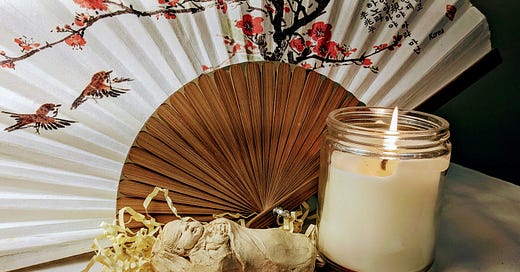

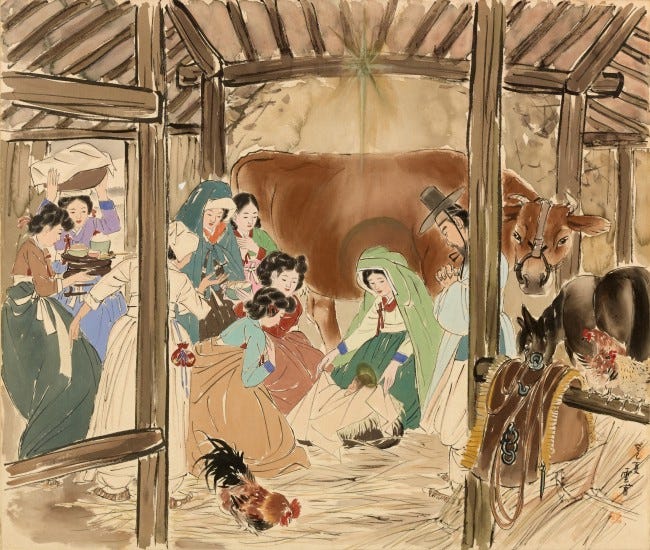


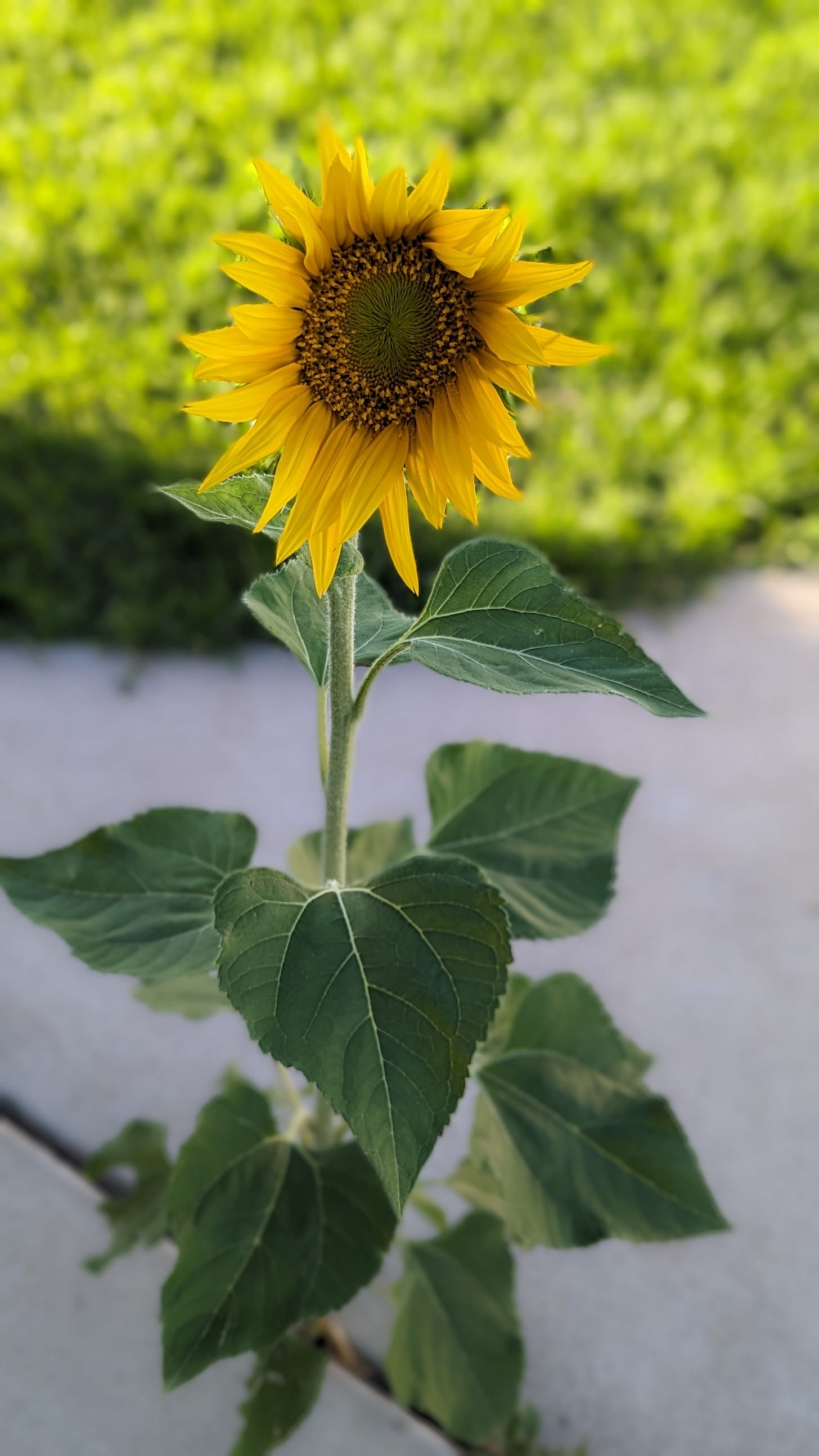


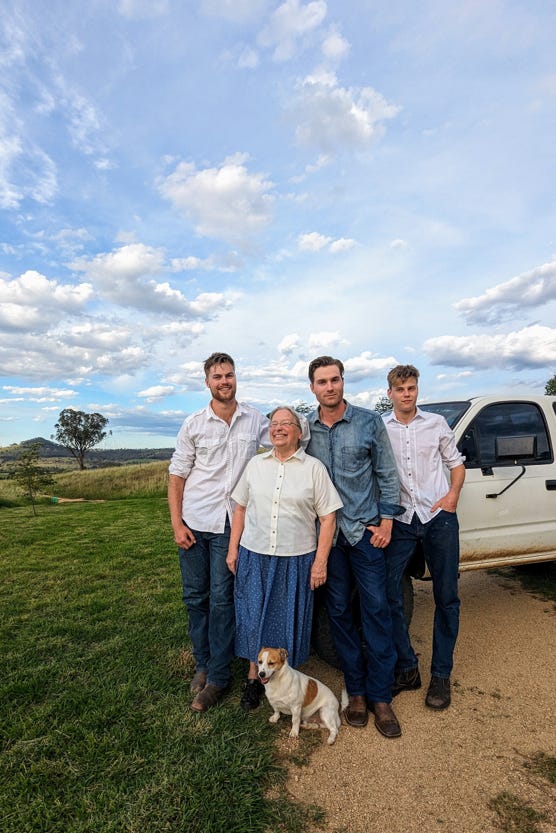
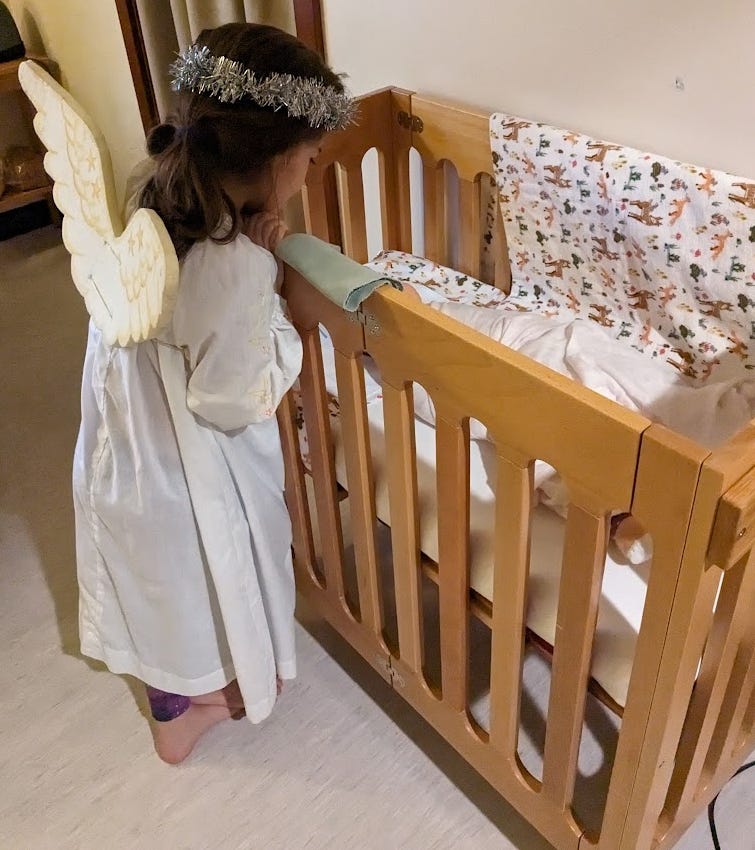
Thank you for your Christmas stories, especially the one about the four old men and the Christ Child.
May we all have peace and joy.